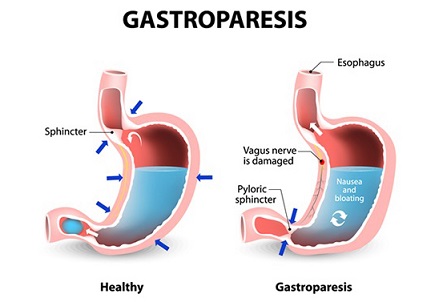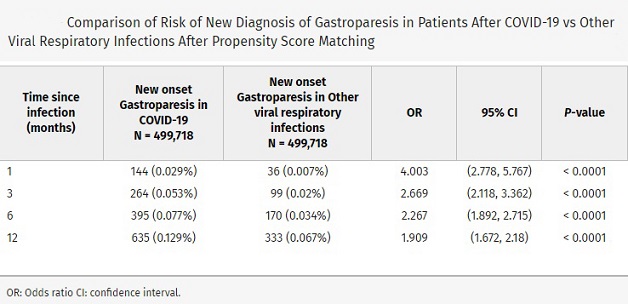BREAKING COVID-19 News! Cleveland Clinic Study Finds That SARS-CoV-2 Infections Can Lead To New-Onset Gastroparesis In Many!
Nikhil Prasad Fact checked by:Thailand Medical News Team Nov 21, 2023 1 year, 4 months, 3 weeks, 6 days, 8 hours, 1 minute ago
COVID-19 News: In a groundbreaking revelation, researchers at the Cleveland Clinic, Ohio-USA, have uncovered a significant association between SARS-CoV-2 infections and the onset of gastroparesis. While gastrointestinal (GI) manifestations of COVID-19 have been acknowledged, this study covered in this
COVID-19 News report delves into the potential long-term consequences, shedding light on the increased risk of gastroparesis following COVID-19 infection.

Numerous published case reports and also studies have also validated that SARS-CoV-2 infections can lead to new onset gastroparesis in many but many Post COVID individuals are not even aware that they have developed gastroparesis till the situation worsens.
https://journals.lww.com/jpgnr/fulltext/2022/05000/postviral_gastroparesis_associated_with_sars_cov_2.9.aspx
https://www.ncbi.nlm.nih.gov/pmc/articles/PMC8036087/
https://houstonheartburn.com/can-covid-infection-cause-gastroparesis/
https://www.casereports.in/printerfriendly.aspx?id=3099
https://www.wjgnet.com/2307-8960/full/v11/i22/5252.htm
https://www.journalmc.org/index.php/JMC/article/view/3883
https://pesquisa.bvsalud.org/global-literature-on-novel-coronavirus-2019-ncov/resource/pt/covidwho-1174983
Understanding Gastroparesis
Gastroparesis, often referred to as delayed gastric emptying, is a disorder disrupting the normal movement of food from the stomach to the small intestine. This condition can impede digestion, leading to symptoms such as nausea, vomiting, abdominal pain, and complications related to blood sugar levels and nutrition. Although there is no cure for gastroparesis, dietary adjustments and medications can provide relief.
Methodology
To address the gap in large-scale studies on the link between COVID-19 and gastroparesis, the researchers utilized the TriNetX multi-institutional database. The study focused on adult patients aged 18-65 with COVID-19 between April 2020 and December 2021. Patients with a history of bariatric surgery or gastroparesis before the index event were excluded. Propensity score matching ensured balanced cohorts, considering factors such as age, sex, race, ethnicity, diabetes mellitus, opioid use, fundoplication, and hospitalizations.
Results
The st
udy included 5,566,643 patients diagnosed with COVID-19 and 499,709 patients with other viral respiratory infections (VRI). After propensity score matching, both cohorts consisted of 499,718 patients. Strikingly, patients with COVID-19 exhibited a higher risk of newly diagnosed gastroparesis compared to those with other VRIs at various intervals: 1 month (OR 4.00), 3 months (OR 2.66), 6 months (OR 2.26), and 12 months (OR 1.90) after infection.
 Implications
Implications
The study's findings raise concerns about potential long-term complications following COVID-19, particularly in the gastrointestinal domain. Although viral infections have previously been linked to gastroparesis, the notably higher risk in individuals recovering from COVID-19 emphasizes the need for heightened awareness and monitoring of such complications. Interestingly, the increased risk appears to diminish over time, prompting the suggestion for long-term gastrointestinal symptom management in COVID-19 survivors.
The study findings were published in the peer reviewed journal: The American Journal of Gastroenterology.
https://journals.lww.com/ajg/fulltext/2023/10001/s1854_temporal_trends_in_the_risk_of_new_onset.2195.aspx
More on Gastroparesis
Gastroparesis is characterized by abnormal motility in the stomach muscles, leading to delayed or halted food movement through the digestive tract. Ordinarily, strong muscular contractions propel food forward, but in gastroparesis, this motility is compromised. The cause of gastroparesis is often unknown, though it can be a complication of diabetes or develop post-surgery. Certain medications, including opioid pain relievers and some antidepressants, may exacerbate symptoms.
Symptoms and Complications
Gastroparesis manifests through symptoms such as vomiting, nausea, abdominal bloating, pain, a feeling of fullness after minimal food intake, and acid reflux. It can lead to severe complications such as dehydration, malnutrition, the formation of solid masses called bezoars, unpredictable blood sugar changes, and an overall decreased quality of life. Importantly, many individuals with gastroparesis may not exhibit noticeable signs and symptoms, underscoring the importance of vigilance and proactive management.
Conclusion and Future Directions
In conclusion, the Cleveland Clinic's comprehensive study establishes a compelling link between COVID-19 and an elevated risk of gastroparesis. This revelation necessitates a paradigm shift in post-COVID-19 care, emphasizing long-term monitoring of gastrointestinal symptoms. The study also calls for further research to confirm these findings and unravel the underlying mechanisms behind the increased susceptibility to gastroparesis in COVID-19 survivors. As the world continues to grapple with the aftermath of the pandemic, understanding and addressing potential long-term complications become imperative for comprehensive healthcare strategies.
For the latest
COVID-19 News, keep on logging to Thailand Medical News.

